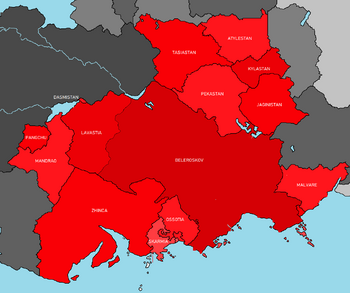United Communist and Socialist States
United Communist and Socialist States | |
|---|---|
|
Flag | |
 | |
| Capital | Koyevka |
| Official languages | Beleroskovi |
| Population | |
• 1999 estimate | 315,981,000 |
| Currency | ruble |
| Date format | mm-dd-yyyy |
The United Communist and Socialist States, abbreviated as the UCSS, was a socialist and communist state that spanned much of South-Central Ausiana from 1905 to 1999. It was nominally a federal union of 10 national republics; in practice its government and economy were highly centralized until its final years. The country was a one-party state governed by the Communist Party of Beleroskov, with Koyevka as its capital within its largest and most populous republic, Beleroskov. Other major urban centers included Jaljur, Eterabi, Haruya, and Noboroskiev.
The UCSS came to be in 1905 after the June Revolution of 1905 when the communists led by Joseph Ibilovich, overthrew the Provisional Government that had earlier replaced the House of Lorovav of the Beleroskov Empire. Much of central Ausiana began joining the UCSS in the 1930s as expansion of Yuan's own system of communism countered with capitalist influence abroad threatened their own ideological influence. The UCSS gained prominence internationally during and following the World War as its forces participated in military campaigns in Haduastan and Beleroskov. In the 1980s, the civil war in Jaginistan and the suppression of revolution in Ossotia helped stir dissent within the UCSS and on 17 March 1999 the individual states of the UCSS seceded en-masse.
The United Communist and Socialist States produced many significant social and technological achievements and innovations regarding military power. It boasted the world's second-largest economy and the largest standing military in the world. It was a recognized nuclear weapons state and was a permanent member of the Coalition of Crown Albatross Security Council - a position which Beleroskov now holds. It exercised its hegemony in South-Central Ausiana and worldwide with military and economic strength, proxy conflicts and influence in developing countries and funding of scientific research, especially in space technology and weaponry.

